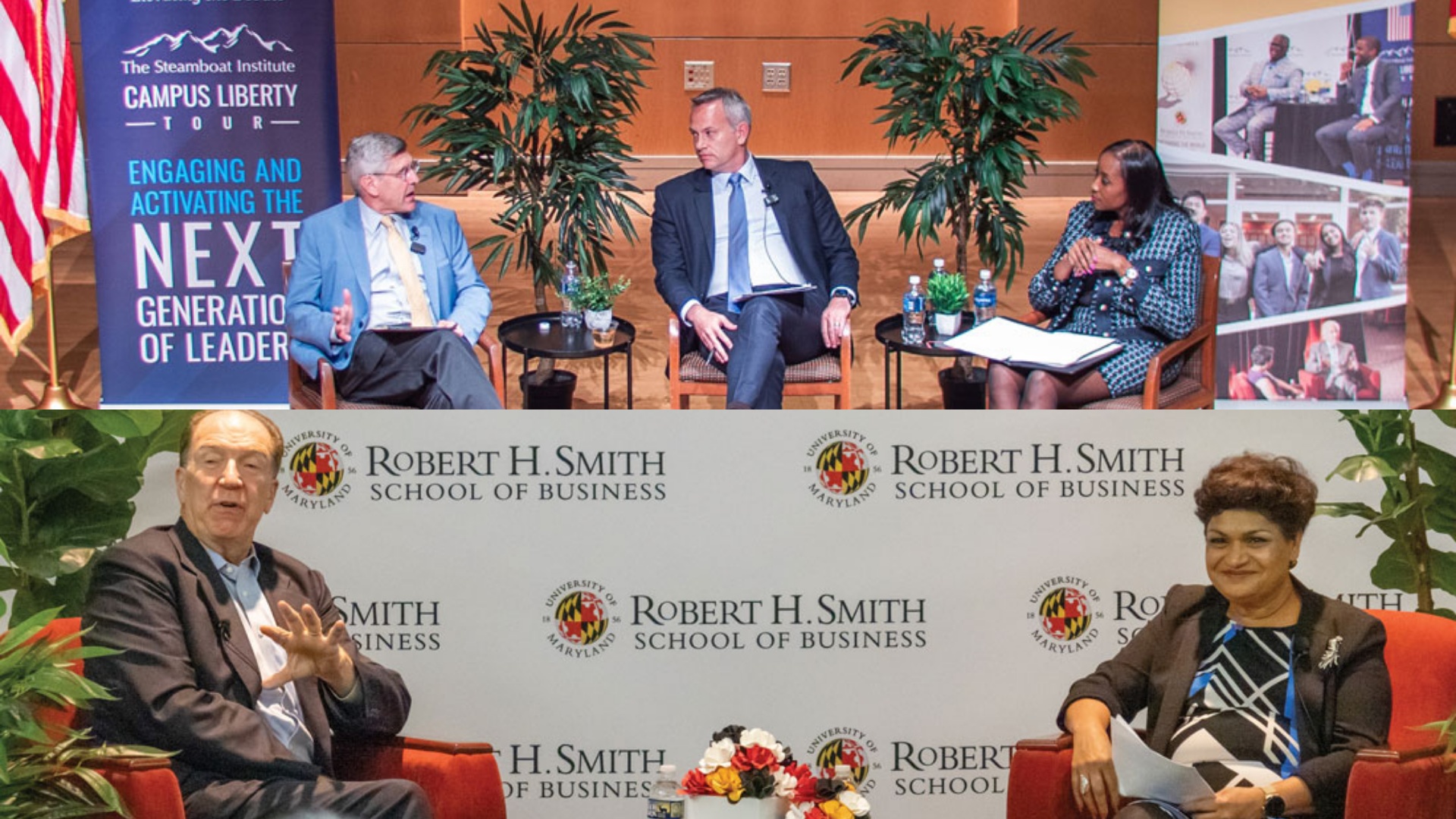
A program launched at Smith last fall fosters free, open and informed dialogue on challenging and significant business issues of our time. The Fact-Based Discourse Initiative (FBDI) provides students with examples of robust but civilized discourse with an emphasis on the development of critical thinking and reasoning skills.
The series, presented by the Ed Snider Center for Enterprise and Markets, featured four events, each held monthly. Topics ranged from international trade and the role of governments to social media’s impact on extremism and zero-sum mindsets.
“Co-curricular efforts like the Fact-Based Discourse Initiative enable our students to challenge their thinking and engage in challenging conversations,” says Rajshree Agarwal, center director. “The ability to challenge underlying assumptions is key to success in solving meaningful problems through human enterprise and creating win-win relationships in business and society.”
The inaugural event featured a screening of the film “Undivide Us,” a documentary discussing current political polarization in the U.S. and strategies to engage in dialogue that appreciates alternative perspectives. Ben Klutsey, executive director of the Mercatus Center at George Mason University, who played a lead role in the movie, met with the students after the screening. During a vibrant Q&A session, students noted appreciation for the importance of being authentic to themselves as they engaged in conversations with respect and curiosity. Klutsey emphasized that the goal of dialogue should not be to change minds, but to create space for appreciating diverse perspectives and deeper understanding.
Former World Bank President David Malpass was the series’ second speaker, whose discussion included diverse topics like international trade, development and migration. As the presidential and congressional elections approached, Malpass noted that while Republicans and Democrats were polarized on many different issues, both subscribed to big government. Reflecting on the implications for the national debt, Malpass said in 1983, “The total national debt was roughly $1 trillion and the country was freaked out about how to handle it. Now it’s at $36 trillion.” He said, “It’s gigantic,” with consequences for economies across the globe.
Bryce Powell, Class of ’28, an operations management and business analytics major, attended the Oct.15 event and remarked on additional aspects of Malpass’ talk. “My viewpoint on the World Bank changed. I was unfamiliar with the scale of its work and the level of integrity behind the bank’s actions.” Powell was surprised to learn how the international financial institution addresses corruption. “I found it particularly interesting that the World Bank works with countries to increase their transparency and trustworthiness.”
The third event featured a debate on the question, “Will a progressive wealth tax create a fairer economy?” Ben Harris, vice president and director of economic studies at the Brookings Institution, spoke affirmatively on the topic against Stephen Moore, a senior visiting fellow in economics at The Heritage Foundation, who provided reasons against it. Feedback from students about the event was uniformly positive. In addition to noting novel insights after listening to the debate, students expressed appreciation for the collegial and respectful dialogue among the speakers—each showed a willingness to agree on some points, even as they debated and disagreed on others.
The last installment in the series was held on Nov. 19 and focused on “Social Media, Business Models & the Promotion of Extremism and Zero-Sum Mindsets.” It featured Balaji Padmanabhan, director of Smith’s Center for Artificial Intelligence in Business; Paul Barrett, deputy director of the Center for Business and Human Rights and senior research scholar at New York University; Joel Finkelstein, co-founder of the Network Contagion Research Institute at Rutgers University; and Barnett Koven, national security specialist and data scientist. The panel discussed the role some social media platforms have played in spreading misinformation and extremist views.
The Fact-Based Discourse Initiative is a prime example of the Smith Guiding Principle: nurture intellectual curiosity and support intellectual freedom. “We believe this is the way to encourage students’ civic engagement in the right manner—informed, respectful to all, and striving for future-looking solutions,” said FBDI programming co-leader and academic director of Smith’s Master in Management Studies programs, Rellie Derfler-Rozin. “As a business school, we aim to be the shining example of such dialogue.”
The Fact-Based Discourse Initiative is one of several sponsored by the Heterodox Academy Campus Community at the University of Maryland. The group is co-chaired by Jacqueline Manger, managing director of the Ed Snider Center for Enterprise and Markets; Rellie Derfler-Rozi, academic director of the Master’s in Management Studies and Online Master of Management Studies programs; Rajshree Agarwal, Rudolph Lamone Chair of Strategy and Entrepreneurship and director of the Ed Snider Center; and Sebastian Galiani, Mancur Olson Professor, from the College of Behavioral and Social Sciences. They will plan additional programming throughout the year, including panel discussions and speaker events to promote open inquiry and viewpoint diversity.
Media Contact
Greg Muraski
Media Relations Manager
301-405-5283
301-892-0973 Mobile
gmuraski@umd.edu
About the University of Maryland's Robert H. Smith School of Business
The Robert H. Smith School of Business is an internationally recognized leader in management education and research. One of 12 colleges and schools at the University of Maryland, College Park, the Smith School offers undergraduate, full-time and flex MBA, executive MBA, online MBA, business master’s, PhD and executive education programs, as well as outreach services to the corporate community. The school offers its degree, custom and certification programs in learning locations in North America and Asia.